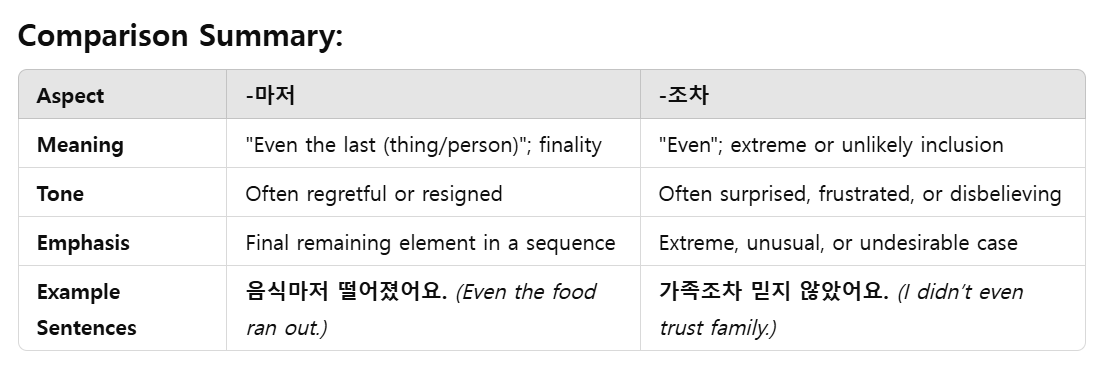Let's study the differences between "-마저" and "-조차" today. Both are particles used to add emphasis, often translated as “even,” but they carry slightly different nuances and are used in different contexts.
Definition and Usage:
"-마저"
"-마저" is used after nouns to indicate that something is the last or final element added to a situation, often with a sense of inevitability or resignation. It emphasizes that everything else has already happened, and now even this last hope or expectation has been affected. This particle often carries a negative or regretful tone.Usage Contexts:
Used when indicating a final element or last remaining part.
Often implies disappointment, inevitability, or even resignation in negative situations.
Examples:친구마저 떠났어요.
(Even my friend left me.)
→ This implies that the speaker has already lost others and now, finally, even the friend left.시간마저 없어요.
(I even have no time left.)
→ Indicates that the speaker lacks everything necessary, with time being the last crucial element.
"-조차"
"-조차" is also used to emphasize "even," but it focuses on an extreme or unexpected case. This particle can highlight surprise, frustration, or disbelief, often in situations where something unlikely or undesirable is included. "-조차" tends to add more emphasis on the unexpected nature of the situation.
Usage Contexts:Used when highlighting an extreme or unexpected inclusion.
Often implies frustration, surprise, or disbelief.
Examples:그는 밥조차 안 먹었어요.
(He didn’t even eat his meal.)
→ Emphasizes that not eating, which is unexpected and unusual, adds to the severity or oddness of the situation.그 일에 대해 생각조차 하기 싫어요.
(I don’t even want to think about it.)
→ Shows strong aversion or unwillingness, emphasizing the unexpected or extreme nature of avoiding the thought.
Additional Notes:
Overlap: Both can sometimes be used in similar situations, but choosing one over the other slightly changes the nuance. Using "-마저" often emphasizes a sense of finality, while "-조차" highlights the extremeness of the situation.
Common Mistakes: Beginners sometimes confuse these particles because both translate as “even.” Remember to consider whether the situation implies resignation (use "-마저") or an extreme/unlikely inclusion (use "-조차").
The two sentences look similar but carry subtle differences in nuance.
그녀의 곁을 친구마저 떠났어요. (Even her last remaining friend left her side.)
In this sentence, "-마저" suggests that others have already left her side, and now even her last remaining friend has left. This implies a sense of finality or resignation, as if this friend was her last support, and now she has lost even that last hope. There’s a feeling of sadness or inevitability.
그녀의 곁을 친구조차 떠났어요. (Even her friend left her side. Which was unexpected.)
Here, "-조차" emphasizes the unexpectedness of the friend leaving. It implies surprise or disappointment, as if the speaker didn’t expect even this friend to abandon her. It’s as if the friend leaving was highly unlikely, making the situation seem more shocking or extreme.
Using "-마저" and "-조차" correctly will add nuance to your expressions, allowing you to convey subtle emotional tones and emphasize specific aspects of situations.




